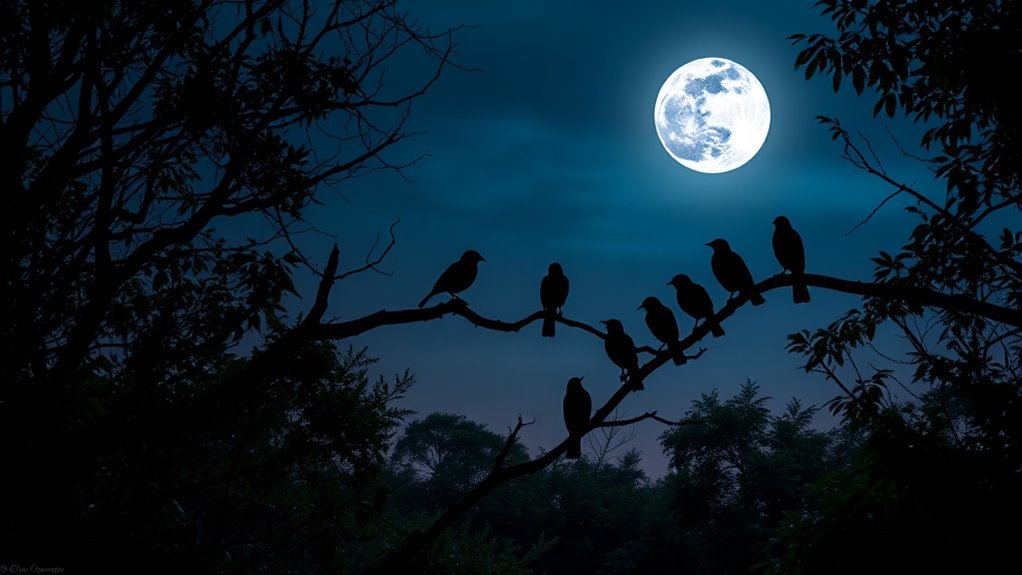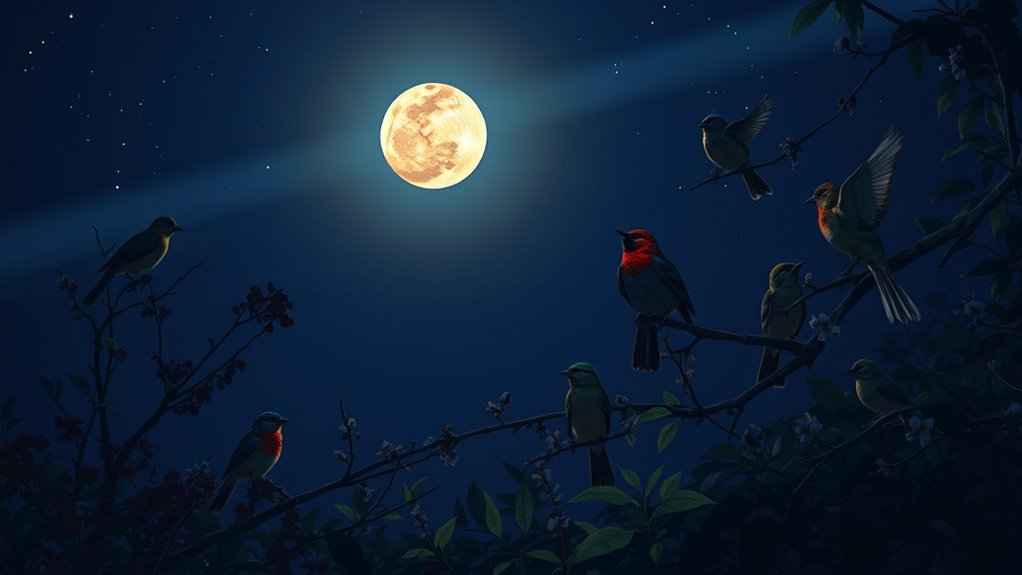Why Do Birds Chirp at Night? Understanding the Meaning
Some birds chirp at night, even when most wildlife is quiet. This behavior serves specific purposes, such as marking territory or attracting mates. These nighttime calls provide insight into bird social behavior and adaptations. Many factors may influence these vocalizations, especially in urban settings. Observing these patterns can reveal interesting aspects of bird communication and survival strategies.
Key Takeaways
- Birds chirp at night to mark territory and attract mates through their unique nocturnal calls.
- Mating calls, such as those from the Eastern Whip-poor-will, act as courtship displays to signal genetic strength.
- Nocturnal vocalizations, especially during spring, increase as birds establish their territories and seek partners.
- Urbanization and artificial lighting disrupt natural behaviors, prompting birds to sing louder at night to communicate.
- Seasonal changes affect nighttime chirping patterns as birds adapt their behaviors based on environmental cues.
The Nocturnal World of Birds

Birds are often known for their morning songs, but they also have an interesting nightlife. Many birds have special habits for being active at night. These habits include calling or singing after sunset.
Birds use their night songs for different reasons. Some sing to mark their territory or find a mate when fewer birds are around. Others have good night vision, which helps them find food in the dark.
Watching these night activities helps you understand how birds fit into their environment. This knowledge can deepen your connection to nature and show you the important roles birds play in the ecosystem.
Common Species That Chirp at Night
Several common bird species sing at night, each with distinct calls and habits. The American Robin often sings at dusk, creating beautiful, haunting melodies.
The Eastern Whip-poor-will is known for its repetitive and eerie call, making it easy to identify. Nightjars also contribute to the nighttime sounds with their soothing songs that blend with the quiet.
Recognizing these birds' nighttime behaviors helps you appreciate their adaptation to darkness. By learning their calls, you can connect more deeply with nature, enhancing your enjoyment of birdwatching.
Listen closely to their sounds to discover new aspects of birdlife.
Mating Calls and Courtship Strategies

At night, the mating calls of various species are both captivating and informative. These calls are part of courtship displays to attract mates.
Nocturnal birds exhibit different breeding behaviors. For instance, the Eastern Whip-poor-will uses repetitive calls to show its presence. Other species perform complex vocal sequences or synchronized duets to demonstrate their fitness.
This sound, amplified by the still night, signals a bird's genetic strength and territory. Each call serves as clear communication aimed at potential partners.
Understanding these patterns enhances our connection to nature and enriches our appreciation of the lively ecosystem at night.
Territorial Defense After Dark
Even in the dark, many birds stay alert and vocalize to defend their territories.
This nighttime activity helps them establish their presence and secure resources.
When you listen carefully, you can hear distinct sounds that reinforce boundaries against competitors.
- A sharp call shows strength and readiness.
- Muffled chirps signal urgency.
- Repetitive sounds create a sense of familiarity and confidence.
- Overlapping calls send a stronger message, forming a chorus of control.
These behaviors highlight the important role of vocal communication in the lives of birds, helping them protect what's theirs even at night.
The Role of Streetlights and Urbanization

Streetlights and urbanization affect how birds behave at night. Urban areas change their natural habitats, increasing the impact of streetlights and noise.
Streetlights create light at night, which disrupts birds' normal behaviors and their sense of time. Birds often sing at night, confusing artificial light for daylight and changing their songs to mark their territory.
The noise from the city makes it harder for them to communicate, as they must sing louder to be heard over traffic and other sounds. This shows how urban life alters bird behavior and interactions.
Understanding these changes helps us connect with the birds living in our urban environments.
Adaptations for Nighttime Activity
As urban areas expand, birds have developed adaptations to thrive at night. These changes help them see better and find food in low light. Here are some key adaptations:
- Larger Eyes: Many birds have bigger eyes to capture more light, improving their night vision.
- Sharp Hearing: Birds can hear very well, allowing them to find prey and communicate in the dark.
- Tactile Foraging: Birds adapt their foraging skills, using touch to locate food.
- Night Chirping: Birds often chirp at night to communicate with each other, helping them stay close and mark their territory.
These adaptations allow birds to live successfully in urban night environments.
They show resilience and the ability to thrive in shared spaces with humans. This enhances their role in urban ecosystems, providing joy for birdwatchers and nature lovers.
Impact of Seasonal Changes on Night Chirping
Seasonal changes affect bird chirping at night. These birds respond to environmental cues like temperature and daylight hours, which influence their nocturnal calls.
In spring, birds often sing more at night to attract mates and establish territory. This behavior shows their adaptation to the season.
In colder months, you'll notice less chirping as birds conserve energy in harsher conditions.
The connection between seasonal changes and nighttime singing highlights how wildlife adjusts to its environment. Understanding these patterns enhances your appreciation for nature and illustrates how life is in tune with seasonal cycles.
Frequently Asked Questions
Do All Bird Species Chirp at Night?
Not all bird species chirp at night. Only certain birds that are active at night use calls to communicate, establish territory, or attract mates. Learning about these nocturnal behaviors can enhance your appreciation for different bird species.
How Can I Attract Nighttime Chirping Birds to My Yard?
To attract nighttime chirping birds, plant suitable backyard plants. Set up feeding stations for nighttime birds. These steps create a friendly environment, inviting more nocturnal birds to visit your yard. Enjoy the sights and sounds of these creatures as they enhance the beauty of your outdoor space.
Are Nighttime Bird Calls Different From Daytime Calls?
Nighttime bird calls are different from daytime calls. These nighttime calls show variations that relate to the species' behaviors and their environments. Each call helps birds communicate and interact with other nighttime creatures nearby. These differences in sound reflect the needs of the birds during the night.
What Time Do Birds Typically Start Chirping at Night?
Birds usually begin chirping at night during evening twilight. As the sun sets, their sounds increase. This behavior shows their activity and communication patterns in the nighttime environment. You may enjoy listening to these chirps while relaxing outside or winding down for the day. The sounds can create a peaceful atmosphere as day turns into night.
Do Night Chirping Birds Sleep During the Day?
Yes, night chirping birds sleep during the day. They are active at night and rest during daylight hours. This pattern helps them save energy. It also allows them to find food and mates more easily at night.

Hello, I’m Emily Price, the founder of Birds Affection. As a passionate bird enthusiast and spiritual seeker, I’ve always been fascinated by the symbolic meanings and mystical connections between birds and our lives. On this website, I share my knowledge and insights on the spiritual significance of various bird species, exploring their roles as messengers, guides, and teachers. Through my writing, I aim to inspire and educate others on the profound wisdom and beauty that birds bring to our world. Join me on this journey as we delve into the enchanting realm of bird symbolism and discover the hidden meanings behind these magnificent creatures.







